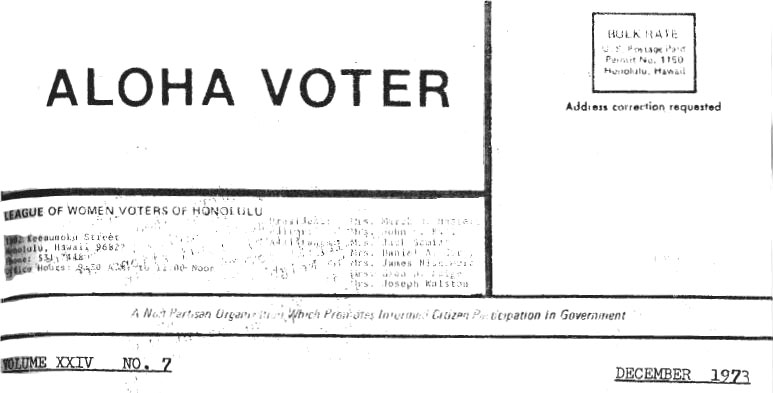 November 1973
November 1973December 1973
 January 1974
January 1974 November 1973 November 1973 |
Home
Newsletters
December 1973 |  January 1974 January 1974 |

 What Does it Really Take to Be Elected? What Does it Really Take to Be Elected? From the President (Diane Hastert) From the President (Diane Hastert) December Calendar December Calendar Money Bag Money Bag Board Bulletin Board Bulletin Learn to Lobby Wrap-up Learn to Lobby Wrap-up League Pulse League Pulse Summary of Memo from Lucy Wilson Benson, National President (Lucy Wilson Benson) Summary of Memo from Lucy Wilson Benson, National President (Lucy Wilson Benson) International Relations and Trade (Barbara Wiebenga) International Relations and Trade (Barbara Wiebenga) Multinationals (Barbara Wiebenga) Multinationals (Barbara Wiebenga) Whatever Happened to the Capitol Guide Service? (Gretel McLane) Whatever Happened to the Capitol Guide Service? (Gretel McLane) Water Pollution Control Water Pollution Control Report from the Hill Report from the Hill Action Alley Action Alley |
Water Pollution ControlInternational U.S. and Russian scientists have signed a preliminary pollution agreement aimed at cleansing the world's oceans. Pact is to be reviewed and approved by both governments. This action follows environmental pollution accord signed in Moscow last year by Pres. Nixon and Soviet Pres. Podgorny. National The Water Pollution Control Act of 1972 which gave EPA (Environmental Protection Agency) power to enforce water standards established two goals:
For 1977 immediate goals were established for industry to place in operation best practicable wastewater control technology currently available with expectations of upgrading system as time goes on. NPDES National Pollutant Discharge Elimination, System established to carry out above act. In the interim, a permit must be obtained in order to discharge any pollutants in the Nation's waters. These must be approved by EPA of the State. Citizens must have access to applications and can also ask for hearings. This includes municipal, industrial and agricultural wastes. Citizens can take court action against anyone violating this act and also against EPA itself, if it fails to perform its duties. PENALTY Any person violating permit conditions will be subject to a fine of not less than $2,500 and not more than $25,000 per day or by imprisonment for not more than 1 year or both. NEPA National Environmental Policy Act requires EIS (environmental impact statement) on any proposed action that would significantly affect the environment. Statement must be made public. Local Health Dept. has just completed revisions in standards for sew age treatment and disposal systems, to bring them in line with new Federal standards. It is in the process of revising public health regulations governing water pollution control and water quality standards. Effluent limitations 1970 law prohibits discharge of radiological, chemical or biological warfare materials or high-level radioactive waste This is a zero discharge requirement. Hawaii Dept. of Health recently sent out questionnaires to 300 businesses and industries in order to determine types and amounts of hazardous wastes. Sewage reclamation and recycling is
encouraged by the new Federal legislation. Citizens can force their localities to examine land treatment techniques. For our area, agriculture, aquaculture and silviculture (forestry) are all possibilities, and there are some research projects being conducted along these lines.
|
 November 1973 November 1973 | Top Home Newsletters |  January 1974 January 1974 |